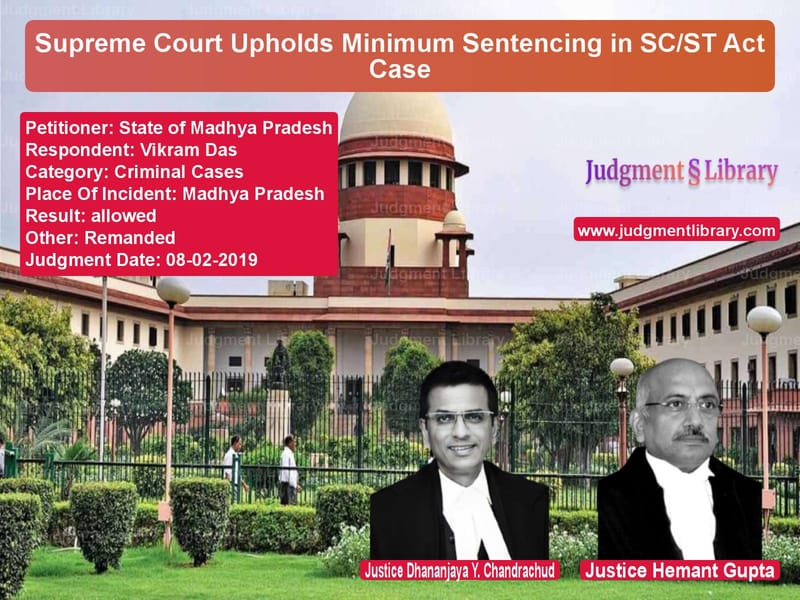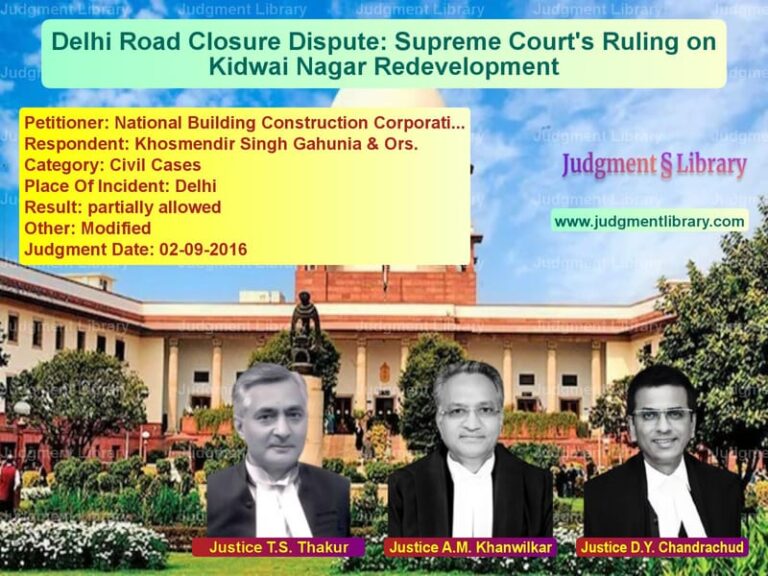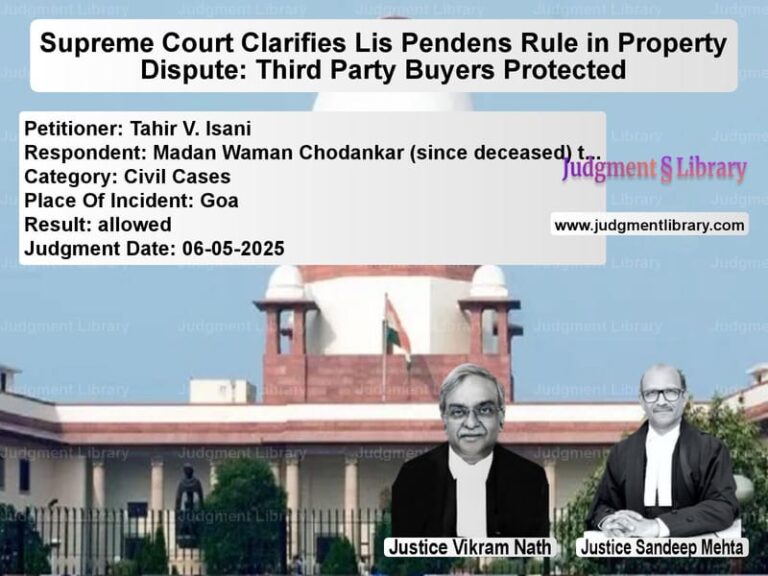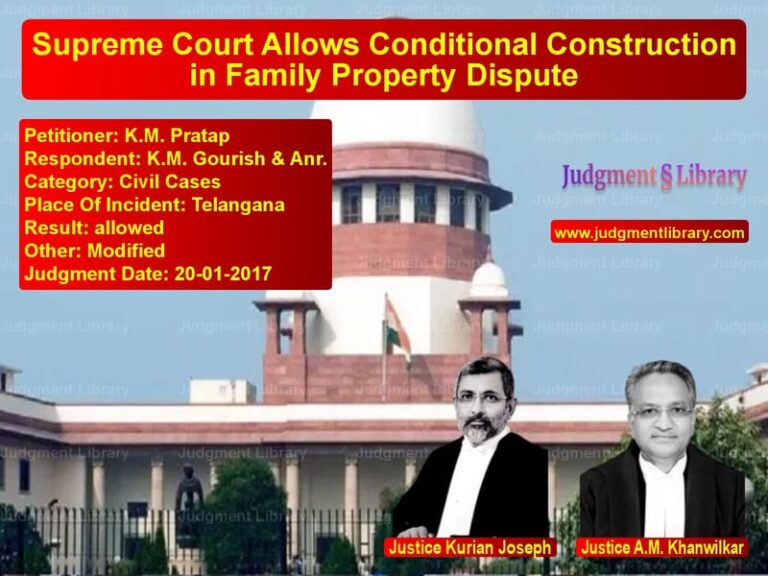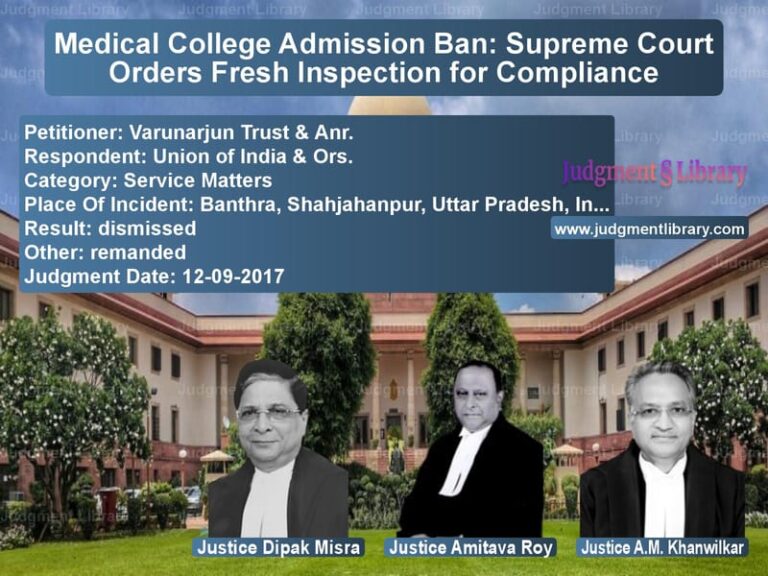Supreme Court Upholds Minimum Sentencing in SC/ST Act Case
The case of State of Madhya Pradesh vs. Vikram Das revolves around the conviction of the respondent under the Scheduled Castes and the Scheduled Tribes (Prevention of Atrocities) Act, 1989 (SC/ST Act) and whether the High Court erred in reducing the sentence below the minimum prescribed punishment. The Supreme Court had to determine whether the High Court’s discretion in modifying the sentence was justified under the law.
Background of the Case
The respondent, Vikram Das, was convicted under Section 3(1)(xi) of the SC/ST Act, which deals with the offense of assault or use of force against a woman belonging to a Scheduled Caste or Scheduled Tribe with the intent to dishonor or outrage her modesty. The Trial Court sentenced him to six months rigorous imprisonment and a fine of INR 500.
Upon appeal, the Madhya Pradesh High Court upheld the conviction but modified the sentence. The High Court reduced the punishment to the period already undergone (11 days) and enhanced the fine from INR 500 to INR 3,000.
The State of Madhya Pradesh challenged this decision before the Supreme Court, arguing that the High Court did not have the authority to reduce the sentence below the statutory minimum.
Legal Issues Before the Supreme Court
The Supreme Court had to decide:
- Whether the High Court was justified in reducing the sentence below the minimum prescribed punishment under the SC/ST Act.
- Whether courts can use their discretion to modify statutory minimum punishments.
- Whether the constitutional power under Article 142 could be invoked to reduce the sentence.
Petitioner’s Arguments
The State of Madhya Pradesh contended:
- Section 3(1)(xi) of the SC/ST Act clearly prescribes a minimum sentence of six months, which the High Court could not reduce.
- The Supreme Court had previously ruled that statutory minimum punishments must be enforced strictly.
- Allowing such modifications would dilute the legislative intent of deterrence behind the SC/ST Act.
- The High Court’s decision was contrary to established precedents and required correction.
Respondent’s Arguments
The respondent, Vikram Das, defended the High Court’s decision, stating:
- He had already served 11 days in jail, and extending the sentence would serve no additional purpose.
- The enhanced fine (INR 3,000) sufficiently served the interests of justice.
- The High Court had exercised its discretion considering the facts and circumstances of the case.
Supreme Court’s Observations
The Supreme Court reviewed the provisions of the SC/ST Act and observed:
“Section 3(1)(xi) of the SC/ST Act mandates a minimum sentence of six months, which may extend to five years. The High Court does not have the authority to reduce this below the statutory minimum.”
The Court referred to previous judgments, including:
- Narendra Champaklal Trivedi vs. State of Gujarat – Where the Court held that statutory minimum sentences cannot be reduced using discretionary powers.
- State vs. Ratan Lal Arora – Which established that special laws prescribing minimum sentences override general sentencing principles.
The Court emphasized:
“The legislative intent behind prescribing minimum sentences under the SC/ST Act is to ensure deterrence and uniformity in sentencing. Reducing the sentence below the statutory minimum would undermine this intent.”
Final Judgment
The Supreme Court ruled:
- The High Court’s order reducing the sentence was set aside.
- The respondent must serve the remaining portion of the six-month sentence.
- The enhanced fine of INR 3,000 remained unchanged.
- The respondent was directed to surrender within four weeks.
Conclusion
This ruling reinforces the principle that courts cannot override statutory minimum punishments unless expressly permitted by law. The Supreme Court’s decision ensures that the deterrence intended by the SC/ST Act is upheld, setting a precedent for strict compliance with legislative mandates in sentencing. The judgment affirms that special laws designed to protect marginalized communities must be strictly enforced to maintain their effectiveness.
Petitioner Name: State of Madhya Pradesh.Respondent Name: Vikram Das.Judgment By: Justice Dhananjaya Y. Chandrachud, Justice Hemant Gupta.Place Of Incident: Madhya Pradesh.Judgment Date: 08-02-2019.
Don’t miss out on the full details! Download the complete judgment in PDF format below and gain valuable insights instantly!
Download Judgment: State of Madhya Prad vs Vikram Das Supreme Court of India Judgment Dated 08-02-2019.pdf
Direct Downlaod Judgment: Direct downlaod this Judgment
See all petitions in SC/ST Act Case
See all petitions in Bail and Anticipatory Bail
See all petitions in Judgment by Dhananjaya Y Chandrachud
See all petitions in Judgment by Hemant Gupta
See all petitions in allowed
See all petitions in Remanded
See all petitions in supreme court of India judgments February 2019
See all petitions in 2019 judgments
See all posts in Criminal Cases Category
See all allowed petitions in Criminal Cases Category
See all Dismissed petitions in Criminal Cases Category
See all partially allowed petitions in Criminal Cases Category

